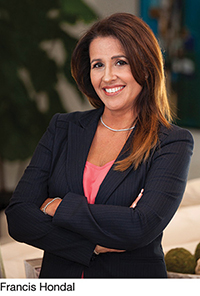
By Ellen Forman
For decades, the public company board of directors stood as the ultimate boy's club, with few women in sight. In the past decade, with the advancement of women into leadership positions, that's changing – albeit slowly.
Women are joining more boards, and more boards are welcoming more than one woman – a critical factor in the ability of women to make a genuine impact.
The recent appointment of outside director Susan E. Arnold as chairman of the board of The Walt Disney Company marks the first time a woman has held the top board position there. Arnold, a 14-year member of the Disney board, has held executive positions at Procter & Gamble and the Carlyle Group and as a director of McDonald's, making her more than up to the task.
In 2017, 87% of S&P 500 firms had at least one female director, up from 65% in 2002. Experts describe three or more female board members as achieving "critical mass." It seems to be happening. In a 2020 study of global boards, more than one-third (38.5%) had at least three women, up from 36.2% in 2019.
In addition to representation, what's important, said Seema Pissaris, FIU Business clinical professor of international business, is understanding what women bring to their board positions. She found in a study that women are more than simply symbols of change.
"Women can actually bring change," she said. "They contribute through novel strategies by reconfiguring the firm's assets and resources in unique ways such as through advertising intensity, research and development pathways or financial leverage design." Pissaris' research shows that women bring innovation to firms' business strategy and have a willingness to take risks.
And their impact increases, she noted, when they own more shares or have longer tenures, allowing them the clout needed to change the status quo.
Does this mean the gender gap in corporate boardrooms will close sometime soon?
"The progress is very slow … look, we're in 2022 and still having this gender conversation," said Pissaris. "It's going to be a long time before we have parity."
 Experts say many successful
women corporate leaders have
had the dual advantage of leading
both a company and a household,
detecting nuance in family issues
and organizing family life. This often
gives them insight into leadership
and HR issues, a critical advantage as recruitment and
retention rise to the forefront of company strategy.
Experts say many successful
women corporate leaders have
had the dual advantage of leading
both a company and a household,
detecting nuance in family issues
and organizing family life. This often
gives them insight into leadership
and HR issues, a critical advantage as recruitment and
retention rise to the forefront of company strategy.
Francis Hondal (MBA '94, BBA '88), president of loyalty and engagement at Mastercard, serves on the boards of Bath & Body Works Inc. (formerly L Brands Inc.), Equitable Holdings and the FIU Foundation, and as a board observer for Flybits. Hondal is driven by the conviction, born by experience, that inclusion matters.
"I have seen the contributions that women and diversity make in business," Hondal said, "and extending that representation to corporate boards has immense benefits that can drive real value for everyone."
Suping Liu (PhD '94, MAcc '89) is a public company CFO and an SEC qualified financial expert. She has been a CFO of several publicly traded and privately held technology companies, and a board member and advisory board member to various private and nonprofit organizations. Her more than 25 years of work experience span virtually every industry, and she has broad knowledge of a wide variety of industries.
And yet, a public company board seat remains elusive.
"In Silicon Valley, a large portion of board members I see are well-connected senior male executives from larger companies; they tend to know each other," she said. While California legislation requires that all public companies have one to two female board members (depending on the size of the board), the change has to be deliberate and intentional.
Liu echoed the convictions of many women seeking board appointments. "If a woman gets put on a board just because she's a woman, that will put you at the table, but they're not going to hear you," she said.
Stav Fainshmidt, FIU Business associate professor of international business, sees these barriers to tech company boards in his research.
"Tech is one sector where it is not as balanced as you might think," he said. "People are often surprised by that industry being behind in terms of female representation."
Fainshmidt also found in strategy research that outside female directors offer an added degree of independence. "Females tend to occupy a lot of outside director roles because they are often outsiders to corporate leadership and industry networks," he said.
Carmen Perez-Carlton (BBA '82) recently joined the board of directors for Blink Charging, a leading owner, operator, and provider of electric vehicle charging equipment and services. Even with an extensive leadership background behind her – she was CEO of FPL's FiberNet – getting on the board of a public company wasn't easy. When her division was sold, she decided to retire from full-time employment and seek positions on public boards. She now sits on two boards of publicly traded companies.
"I didn't think it would be as difficult as it was," she said. "You have to be intentional and self-aware about what value you bring to the board and communicate what your strengths are and the contributions you will make."
LEARN. Spend time immersing yourself in the world of public company directorships. Understand the recruitment process, including agencies that might be a good match in promoting you to their clients.
GET OUT THERE. "Talk to as many people as you can, and let them know what you want to do," Carmen Perez-Carlton noted. Network with organizations such as Women on Boards, which educates women on board leadership and supports their ascension to boards of public companies, and the National Association of Corporate Directors. It's also beneficial to serve on a well-functioning non-profit board, she noted, and take up opportunities to showcase your skills.
SHOWCASE WHAT YOU BRING. Understand what you bring to the table and showcase it, Hondal said. "Now is a great opportunity for diverse talent with relevant experience to join boards given the heightened focus on expanding perspectives, experiences and backgrounds. Emphasizing how your unique talents can help the board achieve a company's goals is key."